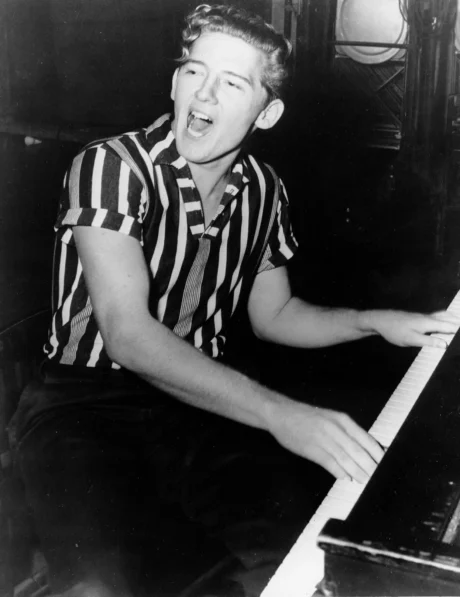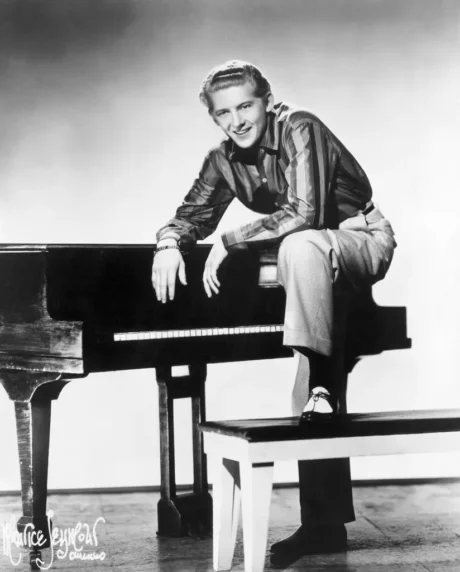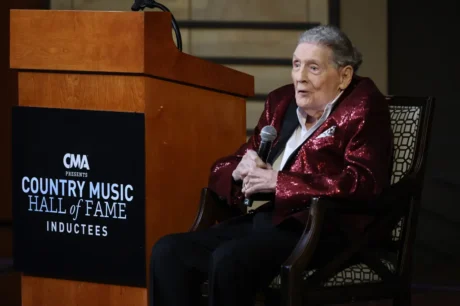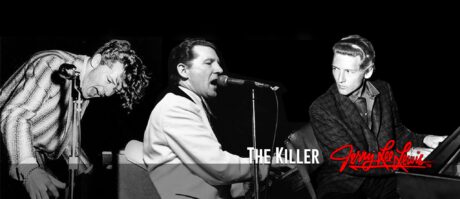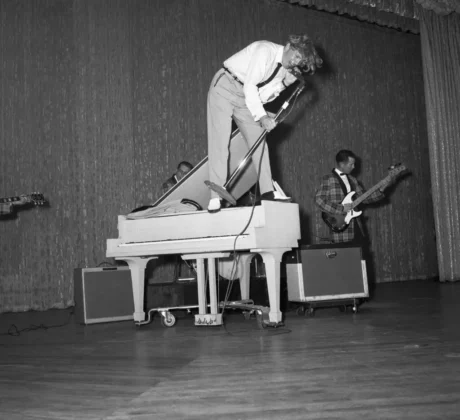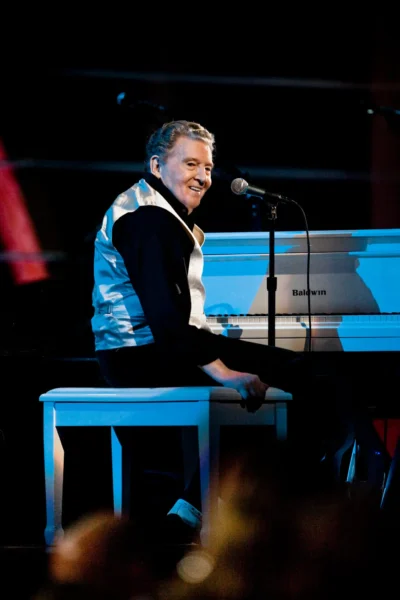Divadelní noviny > Zahraničí Zprávy
Zemřel Jerry Lee Lewis
29. 9. 1935 Ferriday, Louisiana, USA – 28. 10. 2022 DeSoto County, Mississippi, USA
Americký zpěvák, skladatel a pianista, posledním z generace slavných amerických rock´n´rollových hudebníků, mezi které patřil Elvis Presley, Chuck Berry, Carl Perkins nebo Little Richard. Je označován za zakladatele tzv. piano rocku. Během svých vystoupení často odkopnul stoličku, na které seděl, a hrál ve stoje. Prsty nechal dopadat z velké výšky, což vytvářelo dramatický akcent. Občas hrál dokonce nohama nebo si na klavír stoupl a hrál a zpíval na něm. U nás jeho styl hry a přístup k nástroji převzal na svých koncertech Filip Topol.
Narodil se v chudé rodině v městečku Ferriday ve státě Louisiana. Na klavír začal hrát už v dětství se svými dvěma bratranci. Byl ovlivněný rhythm and blues, boogie-woogie, gospelem a country hudbou a brzy si vyvinul vlastní unikátní styl hraní. Později ho jeho matka zapsala na křesťanskou školu v Texasu. Na jednom školním vystoupení ale zahrál gospel My God Is Real ve stylu boogie woogie, čímž si vysloužil vyhození ze školy.
https://youtu.be/F569_t2jCio
Dále si přivydělával jako pianista a z jeho hudby se tak postupně vytrácel křesťanský podtext. V roce 1954 nahrál svoje první demo. O rok později se přestěhoval do města Nashville, kde hrál bez většího úspěchu po místních barech. Odhodlaný pokračovat v hraní, přesunul se v roce 1956 do Memphisu, kde našel producenta Sama Phillipse, objevitele Elvise Presleyho, Carla Perkinse a Johnnyho Cashe, který právě hledal náhradu za Elvise Presleyho, který přešel ke společnosti RCA Records. Lewis pro něj nahrál několik skladeb, včetně svého později největšího hitu Great Balls Of Fire! Další jeho proslulou písní byla Whole Lotta Shakin’ Goin’ On.
V šedesátých letech narůstaly jeho problémy s alkoholem a přibližně kolem r. 1968 se začal orientovat na country (řada hitů v country žebříčku). V r. 1966 se objevil v jedné z hlavních rolí muzikálu Catch My Soul (v L.A.). V první polovině sedmdesátých let se vrátil k r´n´r, byť hudbě country&western se věnoval i nadále. Hrál i v několika filmech, například Disc Jockey Jamboree (1957), High School Confidential (1958) či American Hot Wax (1977).
https://youtu.be/IODq5552eLs
V roce 1989 natočil režisér John McBride antočil hraný biografický snímek Great Balls of Fire s Dennisem Quaidem v hlavní roli.
https://youtu.be/F9l_Lt6vMAU
Získal řadu zlatých desek a čtyři ceny Grammy, včetně té za celoživotní dílo. Za své hudební zásluhy byl v roce 1986 uveden do rock´n´rollové síně slávy (Rock & Roll Hall of Fame). Hudební časopis Rolling Stone zařadil jeho desku All Killer, No Filler: The Anthology na 242. místo ve svém žebříčku 500 nejlepších alb všech dob. před několika dny – 19. října, 36 let po uvedení do Rock & Roll Hall of Fame – byl uveden i do Country Music Hall of Fame. Byl již ale příliš nemocný, aby navštívil ceremoniál v Nashvillu, a tak za něj cenu převzal zpěvák Kris Kristofferson.
Dvakrát yvstoupil i v Praze. Poprvé v roce 2004 a podruhé v roce 2009.
Proslul i svým bouřlivým soukromým životem. Jeho kariéru v šedesátých letech zbrzdilo odhalení, že jeho třetí manželkou byla jeho sestřenice, kterou si vzal, když jí bylo třináct. Celkově se oženil sedmkrát a měl šest dětí, z nichž dvě zahynuly tragickou smrtí. Kvůli daňovým nesrovnalostem žil několik let v zahraničí.
O jeho úmrtí včera informovaly zahraniční tiskové agentury s odkazem na hudebníkova agenta. Úmrtí potvrdil jeho zástupce Zach Farnum. Podle něj zemřel přirozenou smrtí ve svém domě v okresu Desoto ve státě Mississippi. Do poslední chvíle mu byla po boku jeho sedmá manželka Judith, jíž v posledních dnech říkal, že se smrti nebojí a vítá posmrtný život.
…
Na webových stránkách Jerry Lee Lewise vyšel tento nekrolog – zde:
/přebíráme v plném znění/
Jerry Lee Lewis, the last originator of rock, dies at 87
Somewhere in the world, in a mean little honky-tonk or big music hall or church basement rec room, someone is playing a Jerry Lee Lewis song. Wherever there is a piano, someone is shouting…
You shake my nerves and you rattle my brain
Too much love drives a man insane…
“But they won’t play it like the Killer,” Lewis liked to say, as if he needed to make sure the whole world was hearing him right, hearing the pounding genius of it, in songs like “Whole Lotta Shakin’ Goin’ On,” “Breathless” and “Great Balls of Fire.”
“’Cause,” he liked to say, “ain’t but one of me.”
You broke my will
But what a thrill…
Lewis, perhaps the last true, great icon of the birth of rock ‘n’ roll, whose marriage of blues, gospel, country, honky-tonk and raw, pounding stage performances so threatened a young Elvis Presley that it made him cry, has died.
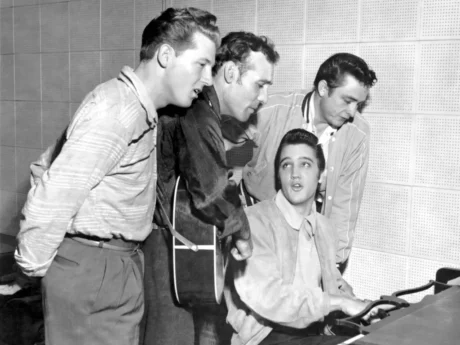
Jerry Lee Lewis, Carl Perkins, Elvis Presley a Johnny Cash ve studiích Sun Records v Memphisu 4. října 1956. Foto Michael Ochs Archives
He was there at the beginning, with Elvis, Johnny Cash, Chuck Berry, Little Richard, Carl Perkins, Fats Domino, Buddy Holly, and the rest, and watched them fade away one by one till it was him alone to bear witness, and sing of the birth of rock ‘n’ roll.
“Who would have thought,” he said, near the end of his days, “it would be me?”
Goodness gracious, great balls of fire!
He suffered through the last years of his life from various illnesses and injuries that, his physicians have often said, should have taken him decades ago; he had abused his body so thoroughly as a young man he was given little chance of lasting through middle age, let alone old age.
“He is ready to leave,” his wife Judith said, just before his death.
Lewis, who performed everything from “Over the Rainbow” to Al Jolson, who played the Opry and the Apollo and even Shakespeare, was 87 years old.
Some music historians have wondered if Lewis, regarded by his fans and many music historians as rock’s first, great wild man, might be indestructible; his obituary has been written, re-written, then shelved, gathering dust for a day that seemed inevitable, but seemed to never come. He defied death in his old age just as he shrugged off the hard-driving, self-destructive lifestyle of his younger years, to play his music to a worldwide audience across seven decades, decorate the walls of his home with Grammys and gold records, and spawn a million outrageous stories — most of them true.
Once, when asked by a biographer: “Is it true that…”
“Yeah,” interrupted Lewis, without waiting to hear the particulars, “it probably was.”
His beginnings sounded like myth. His father, Elmo, and mother, Mamie, mortgaged their farm to buy him a piano, after he climbed onto a piano bench and, without ever having touched a keyboard before, began to play. His nickname, Killer, had nothing to do with his playing, but came from a schoolroom fight in Ferriday when he tried to choke a grown man with his own necktie; still, it fit the man, the musician to come, but there was more to him than a barroom piano pounder who sometimes kept a pistol in his pants.
Musicians and music journalists called him a true virtuoso, whose music was so rich and complex that some of them swore there were two pianos on stage instead of one. He played honky-tonk and blues across the same keyboard in the same instant, could play melody with both hands. He sang rockabilly before he knew it had a name, sang blues, gospel and country in the same set and sometimes the same breath, to become No. 24 on Rolling Stone’s 100 Greatest Artists of All Time. Sam Phillips, who launched the careers of Elvis and Lewis at Sun Records in Memphis, called Lewis the most talented person he had ever seen. A talent that made him one of the very few to be inducted into both the Rock and Roll Hall of Fame’s first class in 1986 and, most recently this past week, at long last, into the Country Music Hall of Fame.
As Lewis stacked hits on the charts in ’57 and Elvis received his draft notice, the reigning king of rock ‘n’ roll drove to Sun Records in tears, to tell Lewis: “You can have it.”
But if Jerry Lee’s life was a comet that streaked across the sky of American music, it was also a thing that scorched him inside and out, and so many of the people around him.
Judith, his seventh wife, was by his side when he passed away at his home in Desoto County, Mississippi, south of Memphis. He told her, in his final days, that he welcomed the hereafter, and that he was not afraid.
Born into the Assembly of God church in his hometown of Ferriday, Louisiana, he never stopped believing, even when his lifestyle made the specter of hell seem closer. His greatest fear, that he would be condemned to a lake of fire for playing what many in his Pentecostal faith called “the devil’s music,” haunted him. He shared his fear with Elvis, who begged him to never mention it again. Lewis thought Elvis, also a Pentecostal, was the one person who might understand, but he died in ’77, leaving Lewis to wonder, alone.
He had prayed every day across his long life for forgiveness, and for salvation. His was a church that believed in miracles; why, he sometimes wondered, should he not be one of them? He found peace near the end of his life in a simple idea: that a music that brought such joy to so many could only come from God, “and the devil,” he said, “didn’t have nothin’ to do with it.”
“He said he was ready to be with Jesus,” said Judith.
His last album was a gospel record with his cousin, lifetime televangelist Jimmy Swaggart, who had preached against his music when they were younger. In Jerry Lee’s final months, they took turns at the keyboard, singing songs they learned as children: “Old Rugged Cross” and “Lily of the Valley” and “In the Garden.” Lewis, though his voice and body were weakened by his injury and a recent stroke, seemed happy, content.
https://youtu.be/jlVB6ezJ9nY
Much of his life, Lewis had seemed determined to leave the world in the great fire he sang about. He set pianos ablaze, busted hecklers in the head with the butt-end of his microphone stand and rammed the gates of Graceland with his Rolls Royce. He shot holes in the wall of his Memphis office with a .38 revolver, shot his bass player in the chest, “by accident,” with a .357. His life, at different times, was a blur of high-speed chases and Crown Royal. The DEA met his planes on the runway. Fortunes came and went; all the wild rock musicians who came after him, he said, were mostly amateurs. Keith Richards tried to toss up a bottle of Crown Royal and catch it by the neck, like him, “but he never did it right … wasted a bunch of good liquor.”
But if you asked him, in his waning years, what he hoped people would say about him, he had a simple answer.
“You can tell ‘em I played the piano and sang rock ‘n’ roll.”
His career, like his body, seemed doomed a dozen times.
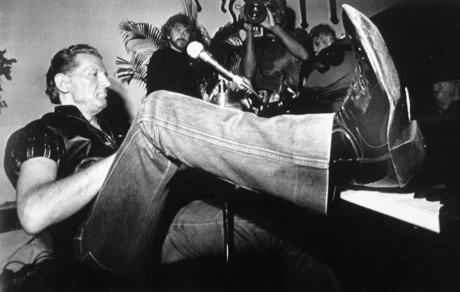
V roce 1989 na party po premiéře jeho biografického filmu The Great Balls of Fire (r. Jim McBride). Foto archiv
After soaring to the top of the charts in ’57 with songs like “Shakin’” and “High School Confidential,” he was castigated in the press for his marriage to his 13-year-old cousin, Myra. His rock’n’ roll star seemed to burn out even as it began to rise, and after a few big hits in the early 1960s his career seemed to be over. He responded by loading two cars with instruments and musicians and hitting the road, to play some big rooms, still, but also every honky-tonk and beer joint that would pay him to perform. He fought his way out of beer joints in Iowa, then drove all night and all day to another town and another show.
Sometimes he gave them magic and sometimes, if the mood was on him, he gave them less, but in his old age he swore he gave them the magic all the time. In ’64, record producers taped his show at a Hamburg, Germany, nightclub and made what would become music history. Live at the Star Club would be regarded as one the rawest, wildest, and greatest live albums of all time.
Then, in a twist that surprised many of his rock fans, Jerry Lee Lewis went country. “Another Place, Another Time,” was just the beginning of a string of soulful country chart-toppers that made him rich and famous all over again. He had more than 30 songs reach Billboard’s Top 10, including “To Make Love Sweeter for You” and a haunting “Would You Take Another Chance on Me.” It seemed only natural to Jerry Lee. He had always believed that Hank Williams hung the moon.
https://youtu.be/sefvAq_Zhu0
In this new stardom he finally played the Grand Ole Opry, the organization that had once snubbed him, and ignored the two-song protocol to play what and for long as he pleased, even playing through the commercials. Then, in perhaps the oddest twist of his musical career, he was cast as Shakespeare’s sinister Iago in a musical production in Los Angeles; he was a natural.
Once again, he flew around the world, sometimes on his own plane, and once again his lifestyle made almost as many headlines as his music. Tragedy followed him; he buried two sons. His health began to fail, marriages failed, but somehow he always rallied, always kept playing, for big paydays, or for free in a Memphis nightclub, living the life he sang about in his songs.
In 2006, his Last Man Standing album sold a million copies, his best-selling album of his long career. He followed that with another success, Mean Ol’ Man. You could hear the ghosts of the old honky-tonks in them, as if Jerry Lee Lewis had, truly, found a way to stop time. He did a duet with Springsteen.
His Lifetime Achievement Grammy was a kind of crowning achievement, and he appeared at Rock ‘n’ Roll Hall of Fame shows to accept his due and to school the whippersnappers on how it was done.
In 2012, when he was 76, he fell in love and married Judith, and they lived quietly – quietly for Jerry Lee Lewis – in northern Mississippi, though Lewis continued to do shows here in the U.S. and abroad. That year they took a trip to Ferriday to visit the family cemetery, and to drive across the bridge to Natchez where, as a boy, Jerry Lee used to dangle over the girders high above the brown water of the Mississippi and the passing boats below. The other boys begged him to get down, but he just hung there, grinning, till they were in tears. When asked if he was scared, a lifetime later, he just looked surprised. The Killer didn’t get scared. But looking down at the river as an old man, he said he might have been crazy.
https://youtu.be/6tRgJUzYgy8
Later, they drove past the church where he beat the piano to pieces with his cousins Swaggart and Mickey Gilley, who would go on to country music stardom, pounding a little blues and honky-tonk into the hymns they were supposed to be practicing.
Just across town from the tiny church had once stood the other temple of his musical education, a blues joint called Haney’s Big House, where some of the biggest acts in the country came to play. As a little boy, he snuck in the door and hid under the tables to hear rolling blues piano and wicked guitar. And somewhere in between it all, between the hymnals and the beer joints, between Hank Williams and Ray Charles, he found something that was his alone. It was always a waste of breath to ask if he had any regrets.
He had a million, and he had none. It all just depended on the song that was running through his head at the time.
“I’ve had an interesting life,” he said, in his 2014 biography, “haven’t I?”
Written by Rick Bragg
—
Jerry Lee Lewis is survived by his wife, Judith Coghlan Lewis, his children Jerry Lee Lewis III, Ronnie Lewis, Pheobe Lewis and Lori Lancaster, sister Linda Gail Lewis, cousin Jimmy Swaggart and many grandchildren, nieces and nephews. He was preceded in death by his parents Elmo and Mamie Lewis, sons Steve Allen Lewis and Jerry Lee Lewis Jr., his siblings Elmo Lewis Jr. and Frankie Jean Lewis and his cousin Mickey Gilley.
Services and more information will be announced in the following days. In lieu of flowers, the Lewis family requests donations be made in Jerry Lee Lewis’ honor to the Arthritis Foundation or MusiCares – the non-profit foundation of the GRAMMYs / National Academy of Recording Arts and Sciences.
/Další obsáhlý nekrolog o něm vyšel v New York Times – zde./
/Pro i-DN z více zdrojů připravil a zpracoval hul/
Komentáře k článku: Zemřel Jerry Lee Lewis
Přidat komentář
(Nezapomeňte vyplnit položky označené hvězdičkou.)

